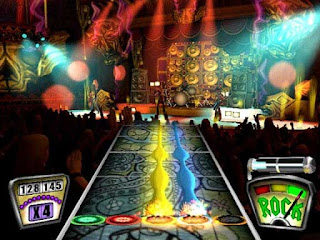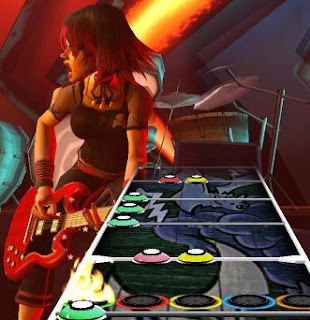 It was a lovely night in here in LA. I was about to go to bed, as I had to wake up early to get to my QA job the next day. I walked out to say goodnight to my roommates, who just happened to be having a lot of fun playing the incredibly popular Guitar Hero II.
It was a lovely night in here in LA. I was about to go to bed, as I had to wake up early to get to my QA job the next day. I walked out to say goodnight to my roommates, who just happened to be having a lot of fun playing the incredibly popular Guitar Hero II."You want to play?" one of my roommates asked. I refused at first, but he persisted.
"Maybe just one song," I said.
I slung the small plastic guitar around my shoulders and instantly felt cooler. I selected a moderately easy song and began to play. I could probably count the number of times I’d played that game on one hand, but something about this night was different. I quickly got the hang of the controls and the song began to sound like it should. My roommates cheered me on. The percentage of notes I hit was consistently improving as one song turned into two, then three, then more. I finally pulled myself away and I went to bed, excited from newfound ability to 'play guitar'.
I had never been strongly attracted to Guitar Hero before. My sister had it and would play it in our house, so I had complete access to the game. I like rhythm games, but this one was pretty loud and hurt my fingers. However, that night made me realize that Guitar Hero can be addicting. You can have literally no knowledge of music and suddenly you can "play" a song. The game is structured so that you feel like you can play just as well as the real rock stars without actually doing all the work.
In a way, Guitar Hero feeds off your ego. Simply by having the word 'hero' in the title, it implies that you have done something great and possibly extraordinary. Within a few hours, you can develop the necessary skills to play harder and harder songs in the game, catapulting you to star status in an incredibly small amount of time.
I spent seven years of my life as a dedicated classical musician. I practiced one to two hours almost every day. Practicing is not at all glamorous. Music requires some of the most intense dedication of any career. With an instrument like the flute, taking just one day off can mean a huge difference in tone for the next one or two days. In some ways, Guitar Hero is almost a cheaters’ method of playing music; it feeds off nearly instant gratification and the satisfaction of playing beloved tunes. In real music, you can play songs you know and love, but it takes a lot of hard work to get there.
While I hesitate to say that I disapprove of Guitar Hero II, I find it hard to love a game that ignores the dedication it takes to become a great musician. I think this game can be a lot of fun, as long as people remember the difference between pressing buttons on a controller and genuinely playing music.
Posted under:
Guitar Hero,
QA/Testing
 Playing games all day and getting paid for it seems like a dream come true. Working in video game quality assurance, however, is a different matter. While my QA summer job means that I am testing games all day on the Wii, Xbox 360, or PS2, it is not the dream many would imagine. I play one game almost exclusively during my 40-hour week.
Playing games all day and getting paid for it seems like a dream come true. Working in video game quality assurance, however, is a different matter. While my QA summer job means that I am testing games all day on the Wii, Xbox 360, or PS2, it is not the dream many would imagine. I play one game almost exclusively during my 40-hour week.While I am not allowed to reveal details about the title I test, I can admit that it can be beaten almost twice in one day. I do enjoy this game, but continually beating it can take some of the fun out of it. Fortunately, I was placed on this title earlier in the testing process so I have been able to watch it improve. One of the most rewarding parts of my job is reporting a bug and seeing it get fixed. In a small way, I can have a direct impact on making the game better.
One of the strangest things about testing is how you can literally do the same thing every day. When I come home, I can list the same accomplishments (beating the game, collecting all the special items, etc.). What separates the days from each other are the experiences that are generated from gameplay, most prominent in multiplayer testing. Even if I find a seemingly fantastic bug one day, I find that nothing compares to the human element in multiplayer testing.
The addition of only one person can make all the difference. The other player can reveal a new play style, making me more aware of the ingrained habits that limit my ability to test the game for the many different types of players who will play the game. It took me over a month before I was shown a small area that I had never known existed. What was common to the other player was a new discovery to me in the game I thought I knew like the back of my own hand.
After being hired as a tester, I began to fear that this job would forever take the fun away from games for me. I once heard an experienced tester explaining how he had crashed nearly every commercial game he had ever played, including Guitar Hero. While my experience as a tester would only last three months, I still feared that I would become bitter toward games, which are inevitably flawed. Like humans, games are never perfect, and the constant pressure of budgets means that many games are released before they are fully ready.
Now that I have spent a few weeks as a tester, I am happy to find that I still love games. Unfortunately, my desire to play console games has diminished greatly, due to my desire to save the strain on my hands and avoid the monotony of doing something that might feel like my job. I get paid to play parts over and over even if they’re frustrating, and I have no desire to experience similar frustrations at home with other games without getting compensated. Fortunately, my DS still feels like an entirely different experience (as it is a portable console) and I have found that I am still excited to play it once in a while. I only hope that I will still feel that way after several more weeks of testing.
 I’ve been playing Puzzle Quest a lot before work lately. There’s something relaxing about immersing yourself in a puzzle for a few minutes before facing the day. I don’t get very far at a time, but the consistent puzzle solving has become a nice habit.
I’ve been playing Puzzle Quest a lot before work lately. There’s something relaxing about immersing yourself in a puzzle for a few minutes before facing the day. I don’t get very far at a time, but the consistent puzzle solving has become a nice habit.I changed my strategy a lot since fighting Dugog the first time. Certain special puzzles, like capture puzzles and spell puzzles allow me to see the board in a different way. The “very hard” difficulty spells require many matches, forcing you to be diligent about creating 4 of a Kinds whenever possible. AI enemies like Dugog may seem ridiculously lucky, but I seem to have gotten more “lucky” lately. I'm going to guess that it's less about luck and more about training yourself to see moves ahead of time.
So just how much of each Puzzle Quest puzzle is based chance as opposed to skill? I don’t think it’s the same answer for every puzzle. For example, all the capture puzzles I have encountered so far have all pieces visible on the screen from the start. No pieces fall into the board, so all is known in the beginning. Winning those puzzles is almost purely a matter of skill.
Spell puzzles and normal battle puzzles seem to be a complicated mix of chance and skill. Spell puzzles have no opponent, so you control every move. While you may not be able to see the pieces that will continue to fall into the board, you usually have many options in the beginning. For example, you could choose to match the first set of three you see or you could search carefully for any possible 4 of a Kinds. Finding more matching pieces in a row can significantly speed the win, reducing the chance of having no moves left and losing.
Finally, the normal battle puzzles seem to be the puzzle type most largely determined by chance. Without the ability to control enemies’ actions, you have little influence over the board you are given each turn. Also, battle puzzles have a large number of spells that can be applied. With a spell like Stun, you can set up a move one turn in advance. The enemies can also resist spells like Stun, creating another factor that you can’t predict.
Puzzle Quest is still holding my interest weeks after I began playing it. I think the chance element plays a large part in this addiction, as sudden victories can occur when your character is hanging on by a thread. The chance can make you feel like it was your clever playing that got you ahead when it may have just been blind luck. Whether or not my skill has kept me alive in Puzzle Quest, I like to think that I am slowly improving my strategy and becoming a great knight.
Posted under:
Puzzle,
Puzzle Quest

